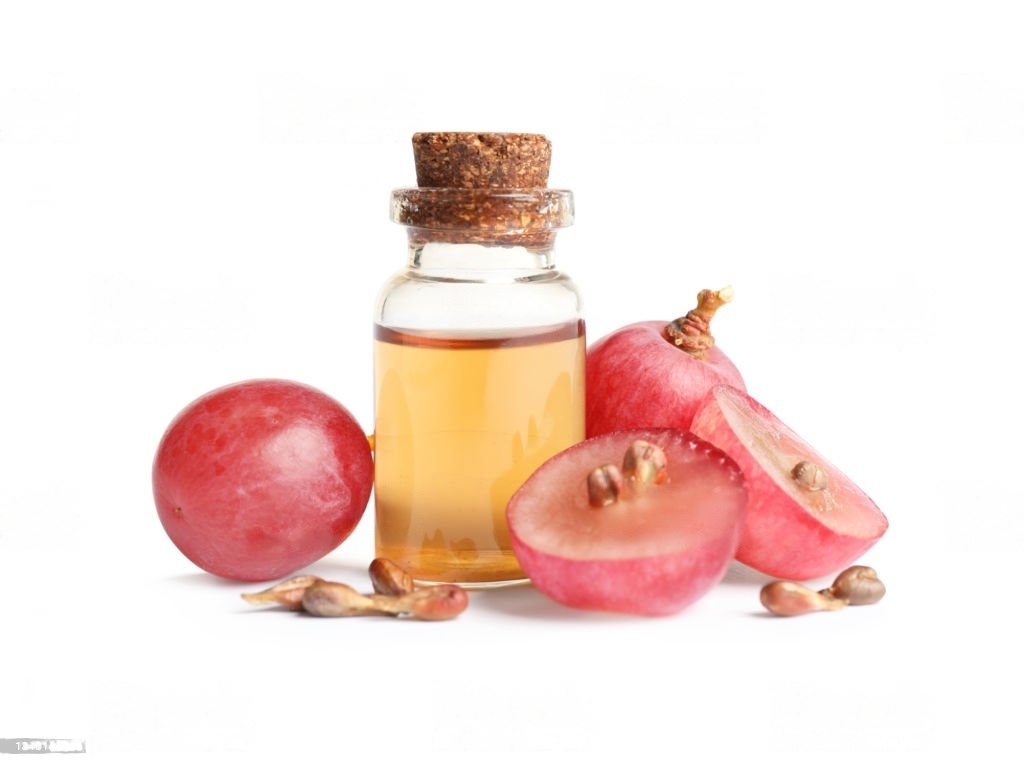
A versatile and nutrient-rich oil, grapeseed oil is extracted from grape seeds and is renowned for its light texture and neutral aroma. People widely use this oil in skincare, cooking, and aromatherapy, and it has a variety of uses that support health and sustenance.
We use a meticulous procedure to extract this oil, harnessing the advantageous qualities of grape seeds. Grape seeds are a byproduct of grape harvesting for wine production. After that, thoroughly washing and drying the seeds removes moisture. The seeds go through a procedure called cold-pressing once they have dried. The oil’s nutritional value, including antioxidants, vital fatty acids, and vitamin E, is preserved by this extraction process, making it valuable in cosmetics, food, and aromatherapy applications. The making of wine and the use of conventional medicines are at the root of the history of this oil.
Ancient civilizations like the Greeks and Egyptians trace their roots back to it, deriving it from grape seeds, a byproduct of winemaking. These cultures utilized it in massages, skincare, cosmetics, and other areas because they identified its wide range of potential. The use of oil in medieval European cuisine and cosmetics gradually increased. This article will cover this oil’s health benefits, usage, precautions, and side effects.
Health Benefits of Grapeseed Oil
Cardiac health
Polyunsaturated fats, especially omega-6 fatty acids like linoleic acid, are abundant in this oil. These fats may improve the lipid profile by lowering LDL cholesterol levels and raising HDL cholesterol levels. Maintaining a suitable ratio of omega-3 to omega-6 fatty acids is crucial for maximum health.
Antioxidant properties
Because of its potent antioxidant qualities, this oil is a popular natural medicine for promoting general health. This oil, which is rich in antioxidants, including proanthocyanidins, flavonoids, and vitamin E, aids in the fight against oxidative stress by scavenging the body of dangerous free radicals. Grapeseed oil’s ability to act as an antioxidant benefits both internal and external uses, highlighting its value as a tool for fostering vitality and long-term health.
Skin Health
Because of its possible skin benefits, Skincare products frequently utilize this oil. This oil’s vitamin E content can help moisturize the skin and enhance general health. It is also suitable for massage and as an essential oil carrier because of its light texture.
Cognitive Health
The antioxidants in the oil may also be advantageous for the brain’s health. According to some research, the polyphenols in this oil may boost cognitive function by shielding brain cells from oxidative damage.
Weight management
Its unsaturated fats, especially linoleic acid, may support heart health and the control of metabolism. A balanced diet that includes this oil can give people a pleasant and nutritious cooking option, aiding their efforts to lose weight. Though this oil can be a healthy addition to a diet, it’s vital to remember that controlling portion sizes and overall calorie intake are important for maintaining a healthy weight.
Joint Health
Oil’s anti-inflammatory effects may benefit people suffering from joint pain. Consuming or using this oil in massage oils may help ease joint pain and discomfort.
How to Use the Grapeseed Oil

Aromatherapy and Diffusion
This oil functions as a carrier to intensify the aroma of other essential oils when diffused in an aromatherapy diffuser. This technique creates a peaceful environment, which aids in relaxation, stress reduction, and better sleep. While this oil may not have a solid intrinsic scent, it can contribute to a therapeutic environment. Prioritize individual preferences and quality oils to ensure an excellent aromatherapy experience.
Topical Application
The oil’s light texture makes it perfect for direct skin application while providing antioxidants and linoleic acid advantages. Its non-comedogenic nature is suitable for all skin types, giving moisture without clogging pores. Antioxidants defend against oxidative stress, which may reduce redness, while anti-inflammatory qualities alleviate irritation. It also works as a carrier oil for essential oil blends in massages and skincare.
Internal use
- Internal use entails ingesting this oil as part of a balanced diet or supplement.
- This oil is high in polyunsaturated fats and antioxidants, which may provide health benefits when consumed.
- A high-omega-6 fatty acid diet like linoleic acid may benefit heart health by lowering harmful cholesterol levels.
- Antioxidants present can protect the body from oxidative stress and inflammation.
- Because of the high-calorie content of this oil, caution is essential.
- Before incorporating it into your diet, consult a healthcare expert if you have any health issues or concerns.
Precautions of Grapeseed oil
Here are some precautions to keep in mind while using this oil in aromatherapy and skincare:
- Before using the oil extensively, always perform a patch test on a small skin area.
- Use only high-quality, pure oil meant for cosmetic and aromatherapy purposes.
- Keep the oil in a cold, dark place to keep the oil from going rancid.
- Apply sunscreen after using this oil for more protection, mainly if you use it on exposed skin.
- If you have unwanted eye contact, wash your eyes with clean water and seek medical assistance if the discomfort persists.
Comparison between grapeseed oil and olive oil
Grapeseed and olive oil, key players in the culinary and wellness worlds, have distinct properties that set them apart. Individuals select these oils based on their culinary needs and wellness goals, each contributing uniquely to a well-rounded lifestyle.
| Properties | Grapeseed oil | olive oil |
| Texture and Absorption | This oil has a light, non-greasy texture that is absorbed quickly into the skin | Olive oil has a somewhat thicker consistency than grapeseed oil. It takes a little longer to absorb into the skin. |
| Odor | This oil is essentially odorless | Olive oil has a unique inherent aroma |
| Skin Benefits | It’s rich in antioxidants, vitamins, and vital fatty acids, which can help with skin health | Olive oil, just like grapeseed oil, is high in antioxidants and vitamins, making it outstanding for maintaining healthy skin |
| Therapeutic Properties | This oil is well-known for its emollient. It has calming and soothing characteristics, making it an ideal choice for sensitive skin or diluting essential oils with powerful effects | People frequently use olive oil due to its profound hydrating properties. Because of its more solid texture, it is ideal for mature or dry skin |
| Aromatherapy Applications | This oil is a typical base oil in massage oils and skincare formulations. Because of its light texture and moderate aroma, it is a flexible carrier oil that works well with various essential oils. | Olive oil is a carrier oil for aromatherapy blends requiring longer massage duration. It’s especially suitable for situations where prolonged Desiring skin contact enhances absorption, facilitating extended massage sessions. |
Conclusion
Grapeseed oil offers a compelling array of health benefits, various applications, and a few points to consider. Its antioxidant-rich nature, light texture, and possible benefits to heart health and skin care make it a captivating option for cooking and aromatherapy. However, as with any natural product, it is critical to recognize potential adverse effects and ensure product quality. A balanced approach and informed selections can help you leverage the many benefits of this oil while limiting any potential negatives as you include it in your lifestyle, whether in the kitchen or your beauty routine.








Leave a Reply